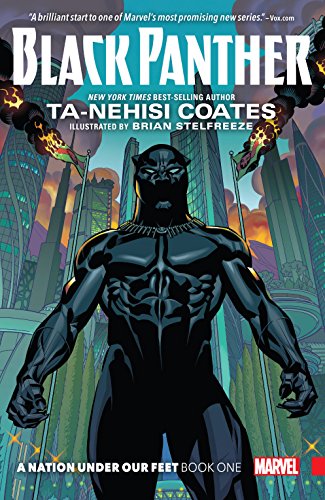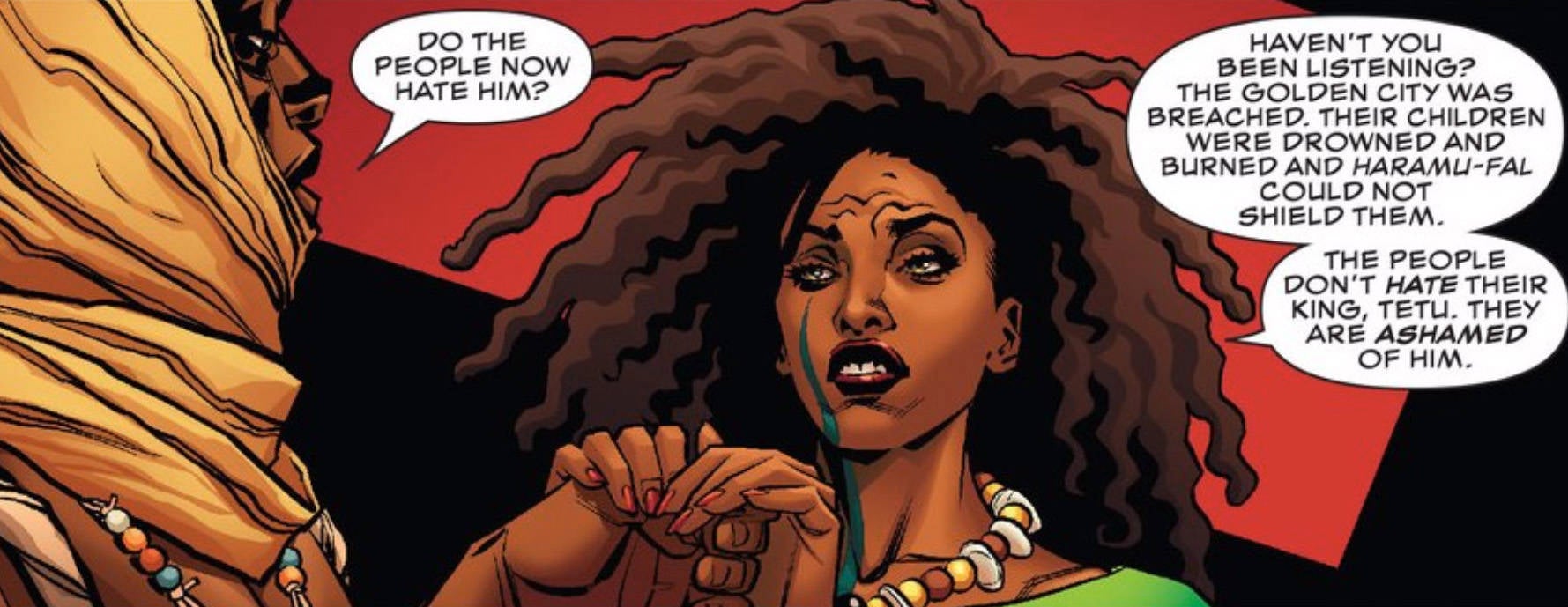
If you're a white boy (or girl) like me, this is likely to be your first foray into Afrofuturism. I think it might be for me, though I can't be sure -- it's not like there's a comprehensive Afrofuturist Registry or whatever. But whether it's your first encounter with Black-created science fiction or your thousandth, Black Panther offers something I can promise (with reasonable certainty) that you've never seen before: a big-budget Hollywood blockbuster movie, created by Black authors, artists, and actors, tied into a major and extremely popular shared cinematic universe, in which Blackness is not only prominent, but portrayed positively and in a way which is central to the story. Black Panther goes to places I never expected to see a Hollywood movie deal with in such a frank manner, and even goes so far as to point the blinding cultural spotlight that is the Marvel Cinematic Universe towards some disturbing and controversial truths.
Yeah, that's right: this movie asks you to consider some uncomfortable facts about race in America, Africa, and the African Diaspora. Deal with it. You'll still get to see awesome fight scenes, top-notch special effects, and subtle nods to Marvel Comics and MCU history. It's not all sad-times and serious business: there's plenty of domestic comedy, explosions, and affectionate kisses from battle-rhinos to keep you entertained.
[This review will contain mild spoilers for the first act of Black Panther, but I'll do my best not to ruin the major surprises for you.]
The tale begins with a visually-stunning infodump which explains the history of Wakanda and its massive deposits of the super-metal vibranium, as well as their decision to conceal their technological prowess from the rest of the world, and how they came to select the first Black Panther as their king. Since then, the title of king-and-Black-Panther has passed from father to son in the royal line: upon the recent assassination of King T'Chaka (John Kani) in Captain America: Civil War, the mantle passes to his son, Prince T'Challa (Chadwick Boseman).
 |
| Women are well and strongly represented; most of T'Challa's entourage, from his bodyguards to his tech guru, are female. |
After that we jump ahead to Oakland, California in 1992, where King T'Chaka shows up unannounced, surprising his younger brother Prince N'Jobu (Sterling K. Brown), who has secretly been arming people of African descent with Wakandan weaponry in order to bring about revolution. T'Chaka is forced by this betrayal -- and N'Jobu's attempt on the life of T'Chaka's adviser -- to kill his younger brother, an act which will have dire consequences for T'Chaka's kingdom . . . and for his son in particular.
Next we skip ahead to the modern day where T'Challa ascends to the throne after a quick round of ritual combat. He learns that Age of Ultron villain Ulysses Klaue (Andy Serkis) -- who recently stole a sizable chunk of Wakandan vibranium and killed several people in the process -- has resurfaced in Busan, South Korea, which prompts T'Challa to round up a posse -- consisting of his ex-lover Nakia (Lupita Nyong'o) and his chief honor-guardswoman Okoye (Danai Gurira) -- and head out to bring him in. This plan of course goes south, forcing T'Challa to return empty-handed . . . or nearly so. CIA operative Everett Ross (Martin Freeman) gets caught in the crossfire of Klaue's escape (which is effected by one Erik "Killmonger" Stevens (Michael B. Jordan), a former U.S. black ops soldier and son of Prince N'Jobu, making him T'Challa's cousin), and T'Challa decides they can't leave the man to die from wounds he sustained in "their" fight. So they pack Ross onto their quinjet and take him back to Wakanda for a round of super-healing . . . which entails exposing their country's technological superiority to an outsider (and a white guy to boot!)
 |
| Michael B. Jordan lends villain Erik Killmonger a formidable emotional range, from a scary-intense calm to a bitter, wrathful spite. |
Alright, that's all the storyline I'm gonna spoil for you. Onward, to the review!
I don't think I've ever seen a movie with a token white guy before: it was an interesting inversion of the status quo. I also think it was a smart move on the writers' part, because by making a White man (Martin Freeman) one of the good guys, they preclude the inevitable racist braying that the film demonizes White people. The film doesn't exclude White people, neither from the protagonists nor from the antagonists, it simply takes the logical step of casting a movie set mostly in Africa with mostly people of African descent. Seems perfectly reasonable to me.
Killmonger is unusual for a Marvel villain: instead of being crazy-eyed psycho or a moustache-twirling omnicidal tyrant, Killmonger is calm and soft-spoken, almost scarily calm: a marked departure from his depiction in the comics, where he's about as restrained as Hulk Hogan. The villain was actually one of the film's strongest points (and Black Panther has a great many strong points). While he's unquestionably evil and clearly not interested in what's best for Wakanda -- or anyone else, including himself -- once we learn his backstory, he becomes . . . not exactly sympathetic exactly (we can't agree with his methods, or even his goals), we can at least understand what made him so fucked-up in the first place, and feel bad for him and his misfortune at the hands of an unjust system and his betrayal/abandonment by the people (his own flesh and blood) who should have taken him in and cared for him.
Black Panther doesn't shy away from uncomfortable truths about the African condition, both in Africa itself and across the globe (e.g., black-on-black crime, institutionalized racism, stereotyping, the need for Pan-Africanism, etc.) As Killmonger points out (as near as I can remember the quote), "Y'all sittin' up here comfortable [while] there's about two billion people all over the world that looks like us, but their lives are a lot harder [than yours]."
Killmonger is unusually philosophical for a Marvel villain: his words (especially his final line of the film) will stay with you long after Black Panther is over. Just make sure you stay until the very, very end.








